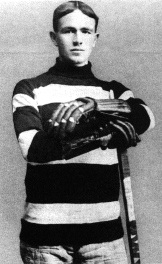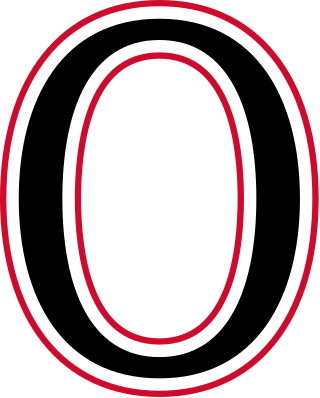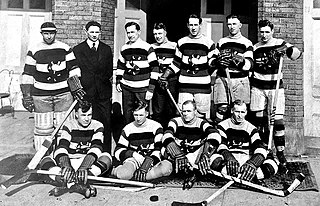Related Research Articles
The Pacific Coast Hockey Association (PCHA) was a professional ice hockey league in western Canada and the western United States, which operated from 1911 to 1924 when it then merged with the Western Canada Hockey League (WCHL). The PCHA was considered to be a major league of ice hockey and was important in the development of the sport of professional ice hockey through its innovations.
The Seattle Metropolitans were a professional ice hockey team based in Seattle, Washington, playing in the Pacific Coast Hockey Association (PCHA) from 1915 to 1924. During their nine seasons, the Metropolitans were the PCHA's most successful franchise, as they went 112–96–2 in their nine years as a franchise. The Metropolitans also won the most regular season PCHA championships, winning five times, with Seattle finishing second on three other occasions. The Metropolitans played their home games at the 2,500 seat Seattle Ice Arena located downtown at 5th and University.
The 1919–20 NHL season was the third season of the National Hockey League (NHL). A Quebec team was activated by the NHL, increasing the number of teams to four. The four teams played 24 games in a split-schedule format. The Ottawa Senators won the league championship by winning both halves of the split-season. The Senators went on to win the Stanley Cup for the first time since the Cup challenge era ended and their eighth time overall, by defeating the PCHA's Seattle Metropolitans three games to two in a best-of-five series in the Stanley Cup Finals.
The 1921–22 NHL season was the fifth season of the National Hockey League (NHL). Four teams each played 24 games. The league dropped the split season and the two top teams played off for the league championship. The second-place Toronto St. Patricks defeated the first-place Ottawa Senators for the league championship.

John Proctor Darragh was a Canadian professional ice hockey player. Darragh played the forward position for the Ottawa Senators in the National Hockey League (NHL) and its predecessor the National Hockey Association (NHA). Darragh was a member of four Stanley Cup championship teams and a NHA championship team (1915).

Frank Corbett "Flash" Foyston was a Canadian professional ice hockey player and coach. Foyston was a member of Stanley Cup championship teams three times: with the Toronto Blueshirts in 1914, the Seattle Metropolitans in 1917, and the Victoria Cougars in 1925. While with the Metropolitans, he twice led the Pacific Coast Hockey Association (PCHA) in goals. After his retirement from playing, Foyston became a minor league head coach. He was inducted into the Hockey Hall of Fame in 1958.

Julius Francis Joseph Nighbor was a Canadian professional ice hockey forward who played primarily for the Ottawa Senators of the National Hockey Association (NHA) and National Hockey League (NHL). He also played for the Toronto Blueshirts of the NHA, Vancouver Millionaires of the Pacific Coast Hockey Association (PCHA), and Toronto Maple Leafs of the NHL. Nighbor won the Stanley Cup once with the Millionaires and four times with the Senators. He was also known as the "Pembroke Peach", "The Flying Dutchman" and as "Peerless Frank."

John Phillip "Jack" Walker was a Canadian professional ice hockey forward who played for the Toronto Blueshirts, Seattle Metropolitans, Victoria Cougars, and Detroit Cougars. He played in all the big professional leagues at the time: the National Hockey Association (NHA), Pacific Coast Hockey Association (PCHA), Western Canada Hockey League (WCHL), and National Hockey League (NHL).

The Ottawa Senators were an ice hockey team based in Ottawa, which existed from 1883 to 1954. The club was the first hockey club in Ontario, a founding member of the National Hockey League (NHL) and played in the NHL from 1917 until 1934. The club, which was officially the Ottawa Hockey Club, was known by several nicknames, including the Generals in the 1890s, the Silver Seven from 1903 to 1907 and the Senators dating from 1908.
The 1917 Stanley Cup Finals was contested by the Pacific Coast Hockey Association (PCHA) champion Seattle Metropolitans and the National Hockey Association (NHA) and Stanley Cup defending champion Montreal Canadiens. Seattle defeated Montreal three games to one in a best-of-five game series to become the first team from the United States to win the Cup. The series was also the first Stanley Cup Finals to be played in the United States, and the last Stanley Cup Finals to not feature a National Hockey League team, as the NHA rebranded as the NHL in November 1917.
The 1919 Stanley Cup Finals was the ice hockey playoff series to determine the 1919 Stanley Cup champions. The series was cancelled due to an outbreak of Spanish flu after five games had been played, and no champion was declared. It was the only time in the history of the Stanley Cup that it was not awarded due to a no-decision after playoffs were held.
The 1921 Stanley Cup Finals was contested by the National Hockey League (NHL) champion Ottawa Senators and the Pacific Coast Hockey Association (PCHA) champion Vancouver Millionaires. The Senators defeated Vancouver three games to two in the best-of-five game series to become the first team to win back-to-back Cup championships since the 1912/1913 Quebec Bulldogs.
The 1923 Stanley Cup playoffs was the second year in which the National Hockey League (NHL) champions, the Pacific Coast Hockey Association (PCHA) champions, and the Western Canada Hockey League (WCHL) champions all competed for the Stanley Cup. The playoffs began on March 16, 1923, and concluded on March 31 when the NHL champion Ottawa Senators defeated the WCHL champion Edmonton Eskimos in the final series, two games to zero.
The 1916–17 NHA season was the eighth and final season of the National Hockey Association. Six teams were to play two half-seasons of ten games each, but this was disrupted and only four teams finished the season. The Montreal Canadiens defeated the Ottawa Senators in a playoff to win the NHA championship.
The 1918–19 Ottawa Senators season was the club's 34th season, second in the National Hockey League (NHL), and they would see much improvement over the previous season. The season was cut short by the Toronto Arenas suspending operations, leaving the Senators and Montreal Canadiens to play the first best-of-seven playoff series to determine the NHL championship, won by Montreal.
The 1919–20 Ottawa Senators season was the club's 35th season of play and third season in the NHL. It was a very successful season, as they set an NHL record for wins (19), points (38), and won both halves of the season, therefore the Sens automatically were awarded the NHL championship and the right to play in the Stanley Cup Finals. The Senators defeated Seattle to win their eighth Stanley Cup title.
The 1920–21 Ottawa Senators season was the club's 36th season of play, fourth season in the NHL, and they were out to defend their 1920 Stanley Cup championship. The club would win the NHL championship and defeat Vancouver in the Stanley Cup Finals to win the club's ninth Stanley Cup.
The 1922–23 Ottawa Senators season was the club's 38th season of play and sixth season in the NHL. They were coming off a disappointing playoff run in 1922, as they lost to the Toronto St. Pats in the NHL finals in a close, hard-fought series. The Senators would finish first in the standings, defeat Montreal in the playoffs, defeat Vancouver in the Stanley Cup semi-finals and defeat Edmonton to win their tenth Stanley Cup title.
The 1923 Stanley Cup Finals was contested by the NHL champion Ottawa Senators and the WCHL champion Edmonton Eskimos. The previous WCHL-PCHA playoff format was abandoned, and the Ottawa Senators now had to play first the PCHA champion Vancouver Maroons, followed by the WCHL champion Edmonton Eskimos in the Finals.

The 1919–20 PCHA season was the ninth season of the professional men's ice hockey Pacific Coast Hockey Association (PCHA) league. Season play ran from December 26, 1919, to March 10, 1920. The season was enlarged to 22 games per team. The Seattle Metropolitans club finished first during the regular season and then won the playoff with the Vancouver Millionaires to take the PCHA championship. The Mets then played in the 1920 Stanley Cup Finals against the National Hockey League (NHL) champion Ottawa Senators. The Senators won the best-of-five series three games to two.
References
Bibliography
- Diamond, Dan, ed. (1992). The Official National Hockey League Stanley Cup Centennial Book. Firefly Books. pp. 52–53. ISBN 1-895565-15-4.
- Howard, Tom, ed. (1921). Official Ice Hockey Guide and Winter Sports Almanac. New York, NY: American Sports Publishing.
- Podnieks, Andrew; Hockey Hall of Fame (2004). Lord Stanley's Cup. Triumph Books. pp. 12, 52. ISBN 1-55168-261-3.
Notes
- ↑ "Stanley Cup Champions 1918-1929". NHL.com. Retrieved August 6, 2021.
- ↑ Howard 1921, p. 49.
- ↑ Howard 1921, p. 53.
- ↑ Howard 1921, pp. 53–55.
- ↑ Howard 1921, pp. 54.
- 1 2 Howard 1921, p. 51.
- ↑ Howard 1921, pp. 55.
- 1 2 Howard 1921, pp. 56.
- ↑ "Seattle stars back at coast boost Ottawa hockey team; Send thanks for hospitality", Ottawa Citizen. Apr. 20, 1920 (pg. 8). Retrieved 2021-05-28.
- ↑ "All Pro Players Under Similar Obligation". The Globe. January 1, 1920. p. 12.
General
- "1919–20 Stanley Cup Winner: Ottawa Senators". Hockey Hall of Fame . Retrieved July 4, 2006.
- "hockeyleaguehistory.com – Pacific Coast Hockey Association". Archived from the original on July 3, 2006. Retrieved July 4, 2006.
- "All-Time NHL Results".
